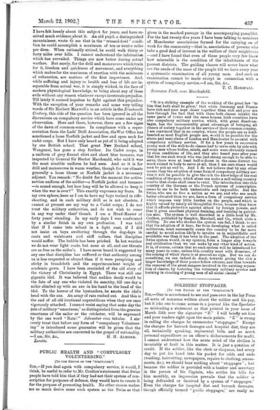PUBLIC HEALTH AND " COMPULSORY VOLUNTEERING."
[TO THE EDITOR OP THE "SPECTATOR.1 SIR,—If you deal again with compulsory service, it would, I think, be useful to refer to Mr. Coulton's statement that Swiss people have told him that if they had not their system of con- scription for purposes of defence, they would have to create it for the purpose of promoting health. No other reason makes me so much desire some such system as the Swiss as that given in the marked passage in the accompanying pamphlet. For the last twenty-five years I have been talking to members of Manchester associations formed for the carrying on of work for the community—that is, associations of persons who take a good deal of interest in the welfare of their neighbours —and I have found that even of these people very few know how miserable is the condition of the inhabitants of the poorest districts. The guiding classes will never know what are the needs of the mass of the people till we have every year a systematic examination of all young men. And such an examination cannot be made except in connection with a system of compulsory service.—'I am, Sir, "It is a striking example of the working of the great law 'to him that bath shall be given,' that while Germany and France have rich and poor kept closer together than rich and poor are here through the fact that with them both classes inhabit the same parts of towns and the same houses, both countries have also compulsory military service, which, with great disadvan- tages, has the immeasurably great advantage of bringing all classes of society together in the service of their common country. I am convinced that in no country, where the people are as kind- hearted as most English people are, would it be possible for the slums and semi-slums of London and Manchester to co-exist with compulsory military service. If for a few years in succession young men of the well-to-do classes had to serve side by side with young men whose bodies, minds, and souls were obviously ruined by slum conditions of life, and they also heard year after year that for one such wreck who was just strong enough to be able to serve, there were at least half-a-dozen in the same district too much ruined in body to serve at all, then I am sure slums would soon be put an end to. And I do not believe that by any other means than the adoption of some form of compulsory military ser- vice it will be possible to give the rich the knowledge of the real condition of the poor, which alone can make a self-ruling country resolve that slums shall cease to exist. The introduction into this country of the German or the French systems of conscription seems to me to be both undesirable and impossible. But the Swiss, who are as free a nation as we are, and who are much better educated than we are, have a form of compulsory service which imposes very little burden on the people, and which is highly valued by nearly all thoughtful Swiss, because they know that it affords protection against attack by foreign powers, and that it gives excellent physical training, and training in patriot- ism also. The system is well described in a little book by Mr. Coulton, published by Simpkin, Marshall, and Co., which costs a shilling. No one who studies the system can fail, I think, to see that the adoption of it here, far from developing what is called militarism, must necessarily cause the country to be far more careful to avoid action likely to involve us in unjustifiable and avoidable war than it has been in the past. The adoption of the Swiss system would, in my opinion, form a longer step towards real civilisation than we can make by any other kind of action. It is, of course, certain that no such system will be introduced for many years to come, unless. this country meet with disasters, of the coming of which there is at present no sign. But we can do something, we can indeed do much, towards giving the rich a larger knowledge of their poorer fellow citizens, and thus towards the removal of the great dangers involved in the existing separa- tion of classes, by fostering the voluntary military service and training in shooting of young men of all social classes."










































 Previous page
Previous page